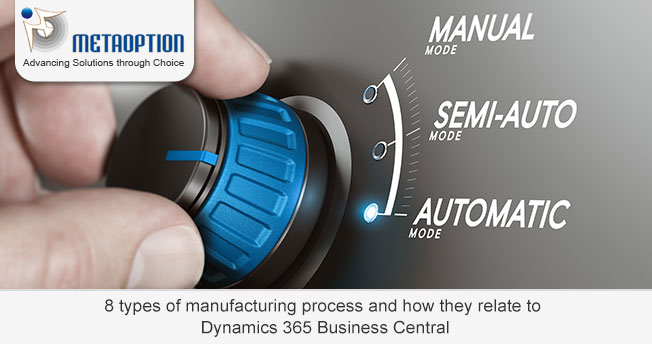It’s important for the manufacturers to understand which mode they have to choose so that their needs can be fulfil with a perfect ERP solution. Whether it is primarily order-taking or collective production and sales processes, as well as inventory management responsibilities. The most significant element of fitting the Dynamics 365 Business Central ERP to a manufacturing company is identifying which manufacturing mode is best to describe while implementing the manufacturing process.

Modes of Manufacturing Process
Job Shop Manufacturing
Usually, Job Shop is a type of small manufacturing company with a pool of equipment they outsource to their customers. They are basically subcontractors who usually only buy materials for a particular job. Also, when they are doing that job, they don’t keep raw materials in stock. As this is the most common type of manufacturing, they mainly focus on employee costs and managing quotations and estimates.
Repetitive Job Shop Manufacturing
When a job shop will specialize in a certain type of production then it is called a repetitive job shop. These shops will buy raw materials to keep in stock because they are committed to delivering parts over a given period of time
Make-to-Order Manufacturing
In this process, the manufacturer creates a line of products for sale in which products are only manufacture after the shipment of an order. It is similar to other modes of manufacturing, such as mass production or assembly line production. Also, it can go against make-to-stock, in which products are manufacture in advance to keep in stock in anticipation of consumer demand.
Configure-to-Order Manufacturing
It is a mix mode manufacturing process where products are being sold from a catalog, but it allows clients or customers to modify the product within parameters. It is often used for products that are highly customized or made in small quantities. Thus, it can be costlier and more time-consuming than other modes of manufacturing.
Make-to-Stock Manufacturing
This mode is like the Make to Order manufacturer, except they have a shorter lead time for delivering their product than they have for manufacturing it. The market generally drives this and forces them to keep an inventory of their finished goods to sell.
Process Manufacturing
There are two main types of process manufacturing i.e., batch and continuous. In a batch process, the product is manufacture in batches or groups of products. In a continuous process, the product is manufacture all at once. This type of manufacturing is implement in a variety of industries, from food production and beverages to pharmaceuticals and cosmetics.
Engineer-to-Order Manufacturing Process
Engineer-to-order companies focus on the ratio of heavy engineering and light production. Here the ratio of engineers to production staff is a good sign to look for when determining if a business is engineer-to-order. Manufacturers design machines to produce, rework, or test products and assist with product development as specified by their customers.
Also, they may have a job shop like a production area with a variety of machines or they may only conduct final assembly. As they often purchase most of their parts from subcontractors and tracking purchases against a job is critical to them.
Mixed Mode Manufacturing
The mixed manufacturing process is an extremely common situation. But basically describes a company that displays more than one of the modes of manufacturing. These companies require the most complex Microsoft Dynamics 365 Business Central implementation. Because it involves accommodating each mode and often the process design involves multiple ways to do the same activity. Identifying where mixed modes of manufacturing exist. And training users to handle the requirements is the most complex part of Business Central implementation in manufacturing.
It’s important to know which process your business falls into so that you can efficiently use resources and better serve your customers.
For more information and a tailored demonstration contact us today at MetaOption.


